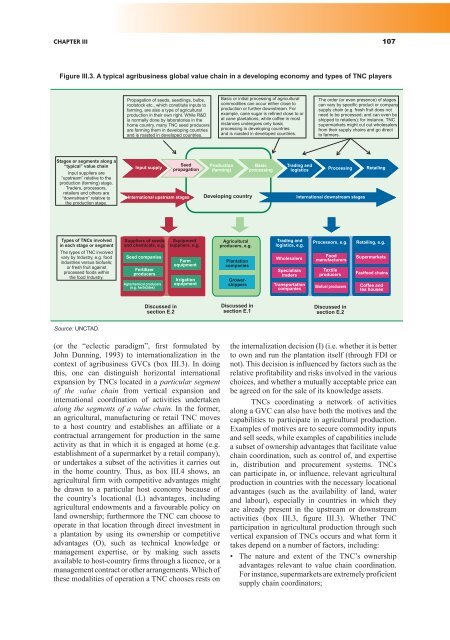World Investment Report 2009: Transnational Corporations - Unctad
World Investment Report 2009: Transnational Corporations - Unctad
World Investment Report 2009: Transnational Corporations - Unctad
Create successful ePaper yourself
Turn your PDF publications into a flip-book with our unique Google optimized e-Paper software.
CHAPTER III 107<br />
Figure III.3. A typical agribusiness global value chain in a developing economy and types of TNC players<br />
Stages or segments along a<br />
“typical” value chain<br />
Input suppliers are<br />
“upstream” relative to the<br />
production (farming) stage.<br />
Traders, processors,<br />
retailers and others are<br />
“downstream” relative to<br />
the production stage.<br />
Types of TNCs involved<br />
in each stage or segment<br />
The types of TNC involved<br />
vary by Industry, e.g. food<br />
industries versus biofuels;<br />
or fresh fruit against<br />
processed foods within<br />
the food Industry.<br />
Source: UNCTAD.<br />
Propagation of seeds, seedlings, bulbs,<br />
rootstock etc., which constitute inputs to<br />
farming, are also a type of agricultural<br />
production in their own right. While R&D<br />
is normally done by laboratories in the<br />
home country, many TNC seed producers<br />
are farming them in developing countries<br />
and is roasted in developed countries.<br />
Input supply<br />
Seed<br />
propagation<br />
Production<br />
(farming)<br />
(or the “eclectic paradigm”, first formulated by<br />
John Dunning, 1993) to internationalization in the<br />
context of agribusiness GVCs (box III.3). In doing<br />
this, one can distinguish horizontal international<br />
expansion by TNCs located in a particular segment<br />
of the value chain from vertical expansion and<br />
international coordination of activities undertaken<br />
along the segments of a value chain. In the former,<br />
an agricultural, manufacturing or retail TNC moves<br />
to a host country and establishes an affiliate or a<br />
contractual arrangement for production in the same<br />
activity as that in which it is engaged at home (e.g.<br />
establishment of a supermarket by a retail company),<br />
or undertakes a subset of the activities it carries out<br />
in the home country. Thus, as box III.4 shows, an<br />
agricultural firm with competitive advantages might<br />
be drawn to a particular host economy because of<br />
the country’s locational (L) advantages, including<br />
agricultural endowments and a favourable policy on<br />
land ownership; furthermore the TNC can choose to<br />
operate in that location through direct investment in<br />
a plantation by using its ownership or competitive<br />
advantages (O), such as technical knowledge or<br />
management expertise, or by making such assets<br />
available to host-country firms through a licence, or a<br />
management contract or other arrangements. Which of<br />
these modalities of operation a TNC chooses rests on<br />
Basic<br />
processing<br />
Trading and<br />
logistics<br />
Processing Retailing<br />
International upstream stages Developing country<br />
International downstream stages<br />
Suppliers of seeds<br />
and chemicals, e.g.<br />
Seed companies<br />
Fertilizer<br />
producers<br />
Agrochemical producers<br />
(e.g. herbicides)<br />
Discussed in<br />
section E.2<br />
Equipment<br />
suppliers, e.g.<br />
Farm<br />
equipment<br />
Irrigation<br />
equipment<br />
Basic or initial processing of agricultural<br />
commodities can occur either close to<br />
production or further downstream. For<br />
example, cane sugar is refined close to or<br />
at cane plantations, while coffee in most<br />
instances undergoes only basic<br />
processing in developing countries<br />
and is roasted in developed countries.<br />
Agricultural<br />
producers, e.g.<br />
Plantation<br />
companies<br />
Growershippers<br />
Discussed in<br />
section E.1<br />
Trading and<br />
logistics, e.g.<br />
Wholesalers<br />
Specialists<br />
traders<br />
Transportation<br />
companies<br />
The order (or even presence) of stages<br />
can vary by specific product or company<br />
supply chain (e.g. fresh fruit does not<br />
need to be processed; and can even be<br />
shipped to retailers); for instance, TNC<br />
supermarkets might cut out wholesalers<br />
from their supply chains and go direct<br />
to farmers.<br />
Processors, e.g.<br />
Food<br />
manufacturers<br />
Textile<br />
producers<br />
Biofuel producers<br />
Discussed in<br />
section E.2<br />
Retailing, e.g.<br />
Supermarkets<br />
Fastfood chains<br />
Coffee and<br />
tea houses<br />
the internalization decision (I) (i.e. whether it is better<br />
to own and run the plantation itself (through FDI or<br />
not). This decision is influenced by factors such as the<br />
relative profitability and risks involved in the various<br />
choices, and whether a mutually acceptable price can<br />
be agreed on for the sale of its knowledge assets.<br />
TNCs coordinating a network of activities<br />
along a GVC can also have both the motives and the<br />
capabilities to participate in agricultural production.<br />
Examples of motives are to secure commodity inputs<br />
and sell seeds, while examples of capabilities include<br />
a subset of ownership advantages that facilitate value<br />
chain coordination, such as control of, and expertise<br />
in, distribution and procurement systems. TNCs<br />
can participate in, or influence, relevant agricultural<br />
production in countries with the necessary locational<br />
advantages (such as the availability of land, water<br />
and labour), especially in countries in which they<br />
are already present in the upstream or downstream<br />
activities (box III.3, figure III.3). Whether TNC<br />
participation in agricultural production through such<br />
vertical expansion of TNCs occurs and what form it<br />
takes depend on a number of factors, including:<br />
�� ���� ������� ���� ������� ��� ���� ������ ����������<br />
advantages relevant to value chain coordination.<br />
For instance, supermarkets are extremely proficient<br />
supply chain coordinators;

















